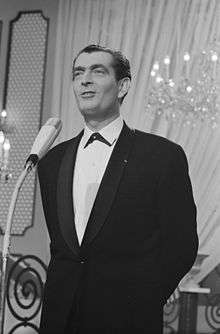Camillo Felgen

Camillo Jean Nicolas Felgen (17 November 1920 in Tétange – 16 July 2005 in Esch-sur-Alzette) was a Luxembourgian singer, lyricist, DJ, and television presenter.
Biography
Felgen started his career as a teacher. During the Second World War, Felgen was a translator for the German occupiers, and then a reporter with a French-language newspaper. He studied theater and opera in Brussels and Liège; in 1946, he joined Radio Luxembourg as a chorus singer and a French-language reporter. In 1949, the mastering of his baritone completed his theatre and opera studies. In 1951, he had his first international hit record, "Bonjour les amies" ("Hello Friends"). The song went on to become the theme song for his national broadcaster. In 1953, he recorded his first German-language record, "Onkel Toms altes Boot" ("Uncle Tom's Old Boat"), in Berlin. He represented his home country in the Eurovision Song Contest 1960 with "So laang we's du do bast", becoming the first male contestant to represent Luxembourg and the first entrant to sing in Luxembourgish. He finished last with only one point. Two years later he entered the contest again, this time doing much better by finishing in 3rd place with the song "Petit bonhomme".
One of the greatest hits of Felgen was "Ich hab Ehrfurcht vor schneeweißen Haaren" (“I Respect Your Grey Hair”), a cover of singer-guitarist and entrepreneur Bobbejaan Schoepen.
Another was "Sag warum", in 1959, based on a melody by Phil Spector.
Camillo Felgen also wrote German lyrics for cover versions of international songs, using the pseudonyms of Lee Montague (writing for Petula Clark, The Searchers, The Honeycombs, among others) and Jean Nicolas (writing for Connie Francis, Caterina Valente, Greetje Kauffeld and Lill-Babs, among others).
As Jean Nicolas, Felgen also translated the only two songs recorded by The Beatles in German, "I Want to Hold Your Hand" and "She Loves You", in 1964. Felgen, then working as a programme director at Radio Luxembourg, was given just 24 hours to finalize the translated lyrics, fly to Paris, and coach the band on German phonetics.[1]
Death
He died in Esch-sur-Alzette on 16 July 2005, at the age of 84.
Footnotes
- ↑ "German Songs: The Beatles". About.com. Retrieved 2007-01-01.
| Preceded by Jean-Claude Pascal |
Luxembourg in the Eurovision Song Contest 1962 |
Succeeded by Nana Mouskouri |
| Preceded by Solange Berry |
Luxembourg in the Eurovision Song Contest 1960 |
Succeeded by Jean-Claude Pascal |
| Wikimedia Commons has media related to Camillo Felgen. |